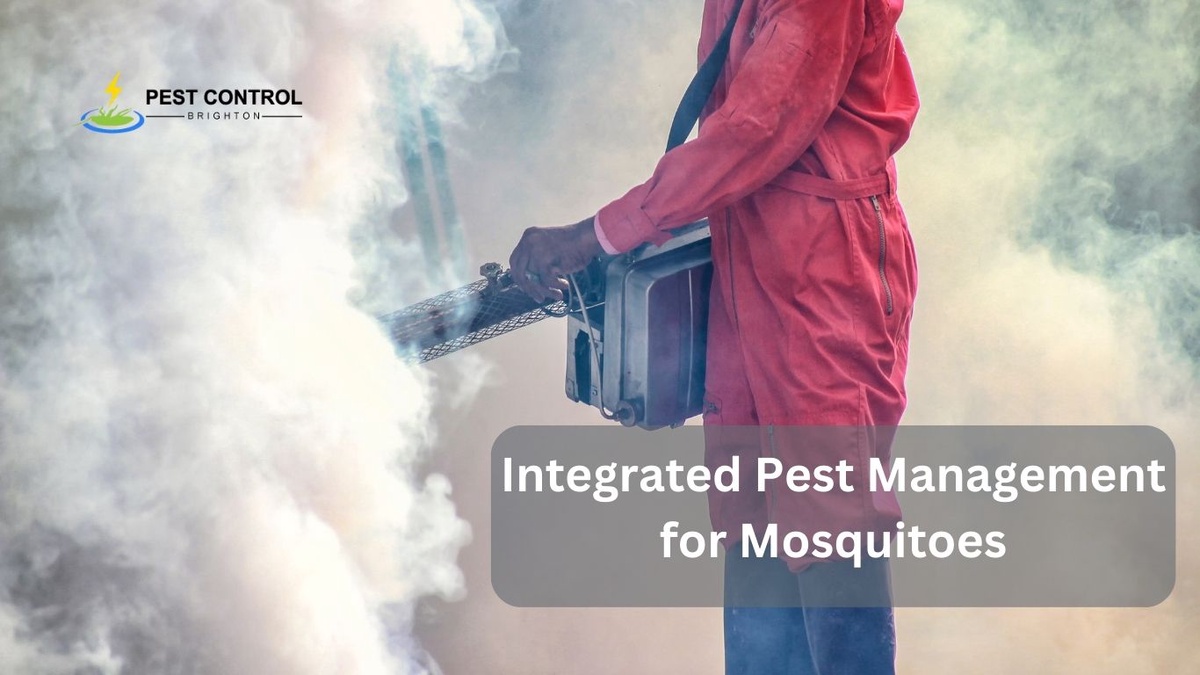Mosquitoes are commonly considered nuisance pests due to their bothersome bites and their tendency to disrupt outdoor activities. While mosquito bites themselves can be irritating and itchy, they can also cause more severe health issues as some mosquitoes are carriers of various diseases, including malaria, dengue fever, Zika virus, West Nile virus, and others. In regions where mosquito-borne diseases are prevalent, the nuisance factor can escalate to a serious public health concern.
You can hire a local pest control agency like Mosquito Control Brighton to do integrated pest management of mosquitoes in your neighbourhood.
Integrated Pest Management (IPM) is an effective and environmentally sensitive approach to managing pests, including mosquitoes. IPM aims to control pests by using a combination of methods that minimize risks to human health and the environment while also being economically feasible. The primary goal is not to completely eradicate mosquitoes but to reduce their populations to levels that do not pose significant health risks.
Here are some components of Integrated Pest Management for mosquitoes:
Monitoring and Surveillance: Regular monitoring of mosquito populations is crucial to understanding their abundance and distribution. Surveillance helps identify potential breeding sites and species, which allows for targeted control measures.
Habitat Modification: Modify the mosquito's breeding habitats to reduce their numbers. This can include actions like eliminating standing water sources where mosquitoes lay their eggs, cleaning gutters, draining stagnant water, and keeping containers tightly covered.
Biological Control: Introduce natural predators, such as mosquito-eating fish (e.g., Gambusia affinis) or specific aquatic insects (e.g., dragonfly larvae), to control mosquito larvae in bodies of water like ponds and ditches.
Larvicides: Use targeted larvicides (insecticides that specifically target mosquito larvae) in areas where mosquito larvae are found but cannot be eliminated through other means. These products are chosen to minimize their impact on non-target organisms.
Adult Mosquito Control: When necessary, use adult mosquito control methods, such as insecticide fogging, but do so judiciously and only when mosquito populations reach a level that poses a significant health risk.
Source Reduction: Work with communities to identify and eliminate mosquito breeding sites on a larger scale, such as abandoned properties, neglected swimming pools, or other areas with standing water.
Public Education: Raise awareness among the public about the importance of eliminating breeding sites and taking personal protective measures, such as using mosquito repellents and wearing protective clothing.
Use of Repellents: Encourage the use of effective mosquito repellents containing store bought repellents or oil of lemon eucalyptus to reduce mosquito bites.
Personal Protective Measures: Advise people to wear long-sleeved clothing and use bed nets to prevent mosquito bites, especially during peak mosquito activity times.
Community Engagement: Involve the community in mosquito control efforts, including reporting potential breeding sites and participating in neighbourhood clean-up campaigns.
Some eco-friendly methods of getting rid of mosquitoes
There are several eco-friendly methods to control and repel mosquitoes without resorting to harmful chemical pesticides. These methods are not only effective but also safe for the environment, humans, and other non-target organisms. Here are some eco-friendly approaches to get rid of mosquitoes:
Remove Standing Water: Mosquitoes require standing water to lay their eggs and complete their life cycle. Eliminating standing water around your home and property can significantly reduce mosquito breeding sites. Regularly empty, cover, or treat containers like flower pots, buckets, and old tires that can collect water.
Biological Control: Introduce natural predators that feed on mosquito larvae to bodies of water where mosquitoes breed. Fish like Gambusia affinis (mosquito fish) and copepods are effective in controlling mosquito populations in ponds and water features.
Mosquito Dunks or Bits: Use mosquito dunks or bits, which are made from a naturally occurring bacteria called Bacillus thuringiensis israelensis (Bti). These products target mosquito larvae and are safe for other organisms in the environment.
Encourage Predatory Insects and Birds: Attract mosquito-eating birds like swallows, bats, and purple martins to your area. They can help keep mosquito populations in check naturally.
Plant Mosquito-Repelling Plants: Certain plants have natural mosquito-repelling properties. Examples include citronella, lavender, basil, peppermint, and rosemary. Planting these around your home or using their essential oils can help repel mosquitoes.
Install Mosquito Nets and Screens: Use mosquito nets over beds and windows to prevent mosquitoes from entering living spaces while allowing for proper ventilation.
Mosquito Traps: Set up mosquito traps that use attractants like CO2 and heat to lure mosquitoes into a container where they are unable to escape, eventually leading to their demise.
Fans and Air Circulation: Mosquitoes are weak fliers, so using fans to create strong air circulation in outdoor areas can disrupt their flight and make it challenging for them to land and bite.
Use Natural Mosquito Repellents: Apply natural mosquito repellents that contain essential oils such as citronella, eucalyptus, lemon, or lavender. These can be effective in repelling mosquitoes without harmful chemicals.
Regular Maintenance: Keep your yard well-maintained by trimming vegetation and bushes, as mosquitoes often rest in shaded, cool areas during the day.
By combining these eco-friendly methods, you can significantly reduce mosquito populations and minimize their impact on your living environment without harming the ecosystem or using toxic chemicals. Additionally, community efforts in applying these methods can lead to broader and more effective mosquito control.
Conclusion
By combining these various approaches, Integrated Pest Management for mosquitoes can significantly reduce their populations and the risks associated with mosquito-borne diseases without causing undue harm to the environment or non-target organisms. It is essential to coordinate efforts between local authorities, health departments, and the public to ensure the success of an IPM program for mosquito control. You can hire local pest control agencies like Pest Control Brighton to apply integrated pest control management to control the mosquito population in your neighbourhood.
Pest Control Brighton is a well reputed pest control agency operating in Brighton and its neighbourhood. We work 24X7; 365 days a year. Please contact us on 0340507532 or online through our website to book a mosquito control appointment.


No comments yet